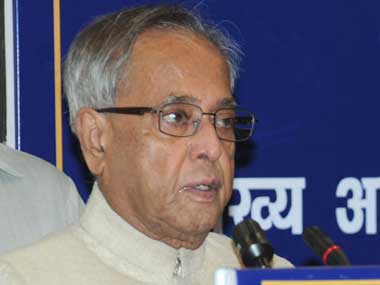Finance Minister Pranab Mukherjee in the Lok Sabha today, defended the steps taken by the government to moderate inflation and infuse growth. Accepting that serious challenges lie ahead for the Indian economy as it limps back on the path of growth and seeks to tame inflation, Mukherjee said on an optimistic note, “Things can improve if institutions are strengthened. This can be done if this House debates and decides and if Parliament functions.” [caption id=“attachment_150164” align=“alignleft” width=“380” caption=“Union Finance Minister Pranab Mukherjee. Image courtesy PIB”]  [/caption] “Assert yourself before those who challenge the authority of Parliament by doing your mandated job. The Indian Constitution given to us by our forefathers within three years of independence is the biggest socio-economic transformation Magna Carta,” he said urging lawmakers to take the legislative business seriously. The minister said the basics of Indian economy are strong even against the pressure of a global economic crisis. “The rate of savings is high. It is around 33-33.5 percent even during these tough times. The investment rate is 34 percent despite depression,” he said. Comparing the growth of the Indian economy with its foreign counterparts within comparable size brackets, Mukherjee said, “In the second quarter of this fiscal year, Turkey grew 10 percent, China and Mexico grew 9 percent each while India made a growth of 7.3 percent. But we have to remember that this growth is against a growth of 9 percent we have witnessed since 2004 prior to the global meltdown.” He said, “In the 80s, the growth was at 5 percent, in 90s and first half of the last decade it was at 5.6 percent.” Reiterating that the Indian economy has passed through turbulent times in different phases, the minister said, “We have faced difficulty. I have seen many major crises. I have seen this country mortgage its gold in humality to a foreign bank for a few million dollars. However, this has changed now. The turnaround has been such that we bought gold worth $2 billion in recent years.” The minister sought to clarify that the Central government alone cannot be blamed for the fluctuating fuel prices. He made it clear that state governments too tax the commodity. “Although people find the fuel prices high, let me tell you that against each 14.2kg LPG cylinder, the loss faced by oil companies is Rs 260 while it is Rs 10 for a litre of diesel and Rs 25 for kerosene per litre,” Mukherjee said, explaining the rationale behind oil and gas pricing. The minister also referred to the fuel pricing norms in the National Capital. “At the refinery gate, petrol costs Rs 43 per litre and by the time it reaches a retail outlet in New Delhi it becomes Rs 73 a litre. Average taxes on petrol in the country is Rs 15 per litre,” he said. The minister also pointed to the Rs 120,000 crore subsidies in fertiliser, fuel and food collectively. Of late, the subsidy bill has rapidly climbed by Rs 80,000 crore and Rs 100,000 crore, he said. Referring to food inflation, Mukherjee expressed happiness that the rate has come down from a whopping 22 percent in January 2011 to 8 percent in December 2011. “Check the prices of 30 essential commodities in 65 retail markets and you will know it. If wheat per kilo costs Rs 23 two years ago and now it costs Rs 24, how can you say we have not done anything on inflation? Would you say nothing has been done and prices have been changing unbridled?” he said. Admitting that even the current inflation is way high for India, the minister said, “India can’t afford to have inflation over 4 to 4.5 percent. Even 8 percent is high.” Talking about tax, Mukherjee said, “Both the direct and indirect taxes have grown 22 percent.”
Finance Minister Pranab Mukherjee said the road ahead for the Indian economy is tough but not impossible to tread on.
Advertisement
End of Article


)
)
)
)
)
)
)
)
)



